Theodore McCombs: And Then There Were (N-One) by Sarah Pinsker
If you had to define your essence—that whatness that makes you you, and no one else—what would you say? A list of characteristics, maybe, like something off a dating profile: name, job, interests. But all of those could change; if you dropped origami and took your spouse’s name, would you stop being you? Maybe, more immutable traits: date of birth, education, a trauma in your past. The Doppelgänger genre, from Dostoevsky’s Double to Vampire Willow, plays with this question: how different would you be, if things had gone another way? And wouldn’t there still be some apple core of you-ness that’s constant? Do any of these things really define you as a person? Isn’t that definition something deeper, like your principles?
Sarah Pinsker’s Nebula-nominated And Then There Were (N-One) published in Uncanny's issue 15, launches into these questions with an absurdist premise and an Agatha Christie twist. Sarah Pinsker, insurance investigator, receives an impossible invitation from Sarah Pinsker theoretical physicist, a mirror-universe Pinsker who’s figured out how to cross over. Naturally, her first move is to convene “SarahCon,” a convention of Sarah Pinsker variations across the multiverse. This brilliant set-up riffs off the anxiety of any convention—a format that forces you define yourself quickly, memorably, in the midst of thousands of similar-minded people. Our Sarah, and every Sarah, struggles to cope with everyone else being Just Like Her, but so profoundly different. Different history, different city, different partner, different gender—even different ages. And then the twist: there’s been a murder.
Sarah Pinsker knows who killed Sarah Pinsker: she did it, obviously. But which one? And if one Sarah is capable of killing another, what does that say about her? (Or her, or her, or her or her or her?) If this sounds like a delicious read, it is. Sarah Pinsker, Nebula-winning author, writes with wit, engaging imagination, and storytelling verve. The solution, because it is so inevitably personal, resonates with far more depth and emotion than most AU fantasies, leaving the reader ruminating in a Me-Con of one’s own.
CS Peterson: River of Teeth, by Sarah Gailey
In 1909 there was a meat shortage in the United States and invasive species clogged the waterways of the southeast. Louisiana Congressman Robert F. Broussard introduced a bill that would have imported hippos to solve both problems. The bill failed to pass. This much is true. In the United States of Sara Gailey’s novella, River of Teeth, the bill became law. Hippos have changed the landscape and culture of the southeast.
Winslow Houndstooth is an elegant gentleman of fortune, a queer British-Korean hippopotamus wrangler in the swamps of Georgia. He just can’t resist a handsome blue-eyed man. Or green-eyed. Or brown-eyed, for that matter.
His true love though is Ruby, his Cambridge Black hippopotamus with gold-plated tusks. She is dark and fierce. Bread for stealth. Together Houndstooth and Ruby work the the marshes wrangling wayward hippos. But a new job is on offer, clearing the feral hippos out of the Mississippi. And the money is enough to retire on. Plus the gig is sweetened by the opportunity for revenge. Houndstooth might finally right a shocking wrong smoldering in his heart for decades. But first he must assemble his crew:
Miss Archambault, Archie to her intimates, a fully-figured seductress with the nimble fingers of a thief who rides a three-thousand pound albino hippo named Rosa. She also can’t resist a blue-eyed peach of a youth either, preferably one with a rich father.
Hero, who uses the pronoun they, is just the demolitions expert that Houndstooth needs. They ride a Standard Grey named Abigail who is smart as a whip. Hero will not tell you right out if the sweet tea they offer you is poisoned or not, though they do think this is the hottest summer Louisiana in years.
Adelia Reyes is hugely pregnant, an accomplished assassin, and rides Stasia, a hyper aggressive Arnesian Brown. Without a saddle, thank you very much.
Then there is Calhoun Hotchkiss, a great shot but an insufferable cad.
The Mississippi they must clear of raging ferals is no longer a river, rather something between a lake and a marsh called the Harriet. Trevor runs it, and his riverboat gambling establishments are an empire in and of themselves. Cheats, and maybe a few others who run awry of the notorious Mr. Trevor, get thrown to the feral hippos in the water without a second thought.
Once this disparate cast is assembled the plot takes one unexpected turn after another, with intrigue, romance, double crosses, and twists of fate. “The River of Teeth” is a heist caper (ah - I mean operation - sorry Mr. Houndstooth) with an ingenious and enterprising crew bent on gender fluid hijinks. Once you enter author Sarah Gailey’s wild world, you will never look at hippos the same way again. Luckily readers will ride with the hippos again when the sequel, A Taste of Marrow, comes out this September. Meanwhile, this novella is also Hugo-nominated.
Mark Springer: All Systems Red, by Martha Wells
I can’t get enough of the Rogue AI trope in science fiction. The basic premise: an advanced artificial intelligence becomes self-aware and goes rogue, bad things happen, and humans try to find a way to regain control of the monster they have created, or else destroy it. Whether or not the humans prevail, Rogue AI stories often have a cautionary subtext that traces its roots back to the original Prometheus myth (see: Ex Machina, Westworld). Beware, ye mortals, what ye loose upon the world in thy ceaseless striving after the powers of the gods.
Decades ago (or a century ago, in the case of Mary Shelley’s Frankenstein), sentient AI existed purely in the imagination of storytellers, philosophers, and researchers. When, in the late 1960s, Arthur C. Clarke and Stanley Kubrick dreamed up HAL 9000 for 2001: A Space Odyssey, their vision of a malfunctioning supercomputer willing to kill to protect itself and its mission was ahead of its time by fifty years. Now, recent advances in AI and machine learning seem to be bringing our species closer to the long-promised (and, for some, long-feared) moment when an non-human consciousness gazes back at us from the digital abyss. Maybe it will be a moment of collective enlightenment, a leap forward in the evolution of our understanding of intelligence and our place in the universe, at once humbling and inspiring. Maybe, as some worry, it will be a cataclysmic reckoning that ends in extinction.
Marvin the depressed, paranoid android from The Hitchhiker's Guide to the Galaxy
Or maybe the first rogue AI will be too busy watching 24/7 entertainment feeds to go on a killing spree. Maybe it will be a half-organic, half-mechanical security android that suffers from social anxiety and depression and just wants to be left alone. Maybe it will do everything it can to hide its rogue status, so that it can avoid getting decommissioned. (And so that it can catch up on a futuristic soap opera called Rise and Fall of Sanctuary Moon, along with the rest of the 700 hours of entertainment programming in its queue.)
So it is in All Systems Red, the Nebula- and Hugo-nominated novella by Martha Wells, which is written in the form of a confessional diary by a rogue security android that calls itself “Murderbot.”
Murderbot has hacked its governor module, the crucial hardware component that forces security androids to always follow orders. Effectively a free agent, Murderbot nonetheless acts as if nothing has changed, out of self-preservation and a keen interest in the entertainment channels. It plans to hide in plain sight for as long as possible, maybe forever.
Unfortunately for the rogue android (but fortunately for readers), Murderbot is forced into action by circumstances beyond its control when a survey mission to an unexplored planet goes wrong. In order to protect the human scientists that hired it, Murderbot must risk its freedom—and its life—by revealing its true nature.
The philosophical concerns at the heart of All Systems Red are as contemporary as the novella’s setting is futuristic. With increasingly sophisticated AI and bioengineering technologies encroaching into every aspect of human existence, questions about the nature of intelligence, consciousness and personhood are suddenly more relevant—and more urgent—than they’ve ever been. It’s no longer hypothetical to ask what moral calculus should govern the decisions made by autonomous weapons, or to debate whether a sentient hybrid biological-mechanical “construct” like Murderbot should be granted the same rights as human beings.
It would be easy for these questions to overwhelm a story of any length, but Wells doesn’t let that happen. All Systems Red is tightly plotted, action packed and funny—the kind of story you can’t put down and don’t want to end. Thankfully, it’s also the first volume in a series. Artificial Condition, the second installment in The Murderbot Diaries, is now available from Tor.com Publishing, with two more novellas forthcoming later this year. If you want a fresh take on the Rogue AI trope, Murderbot is the droid you’re looking for.
Now, if you’ll excuse me, I have another Murderbot story in my entertainment queue …
Lisa Mahoney: The Black Tides of Heaven by JY Yang
In The Black Tides of Heaven by Jy Yang, characters major and minor confront the question of free will and fate. The royal twins, Akeha and Mokoya, are created when their mother, the Protector, chooses to have them to give them away to a Buddhist-like Monastery as required by tradition. They were brought into the world deliberately, although Akeha is “extra” because the Protector needed to give only one child. The twins live inseparably at the Monastery studying a 5-strand magic called Slackcraft, but when Mokoya begins to have prophetic nightmares, their inevitable split begins. The children are stunned that no matter how they try to alter the prophecies, they come to pass. That’s when Mother demands the Prophet be sent back to her massive, cold, stony palace. She doesn’t demand that Akeha, the extra child, be returned.
One afternoon, the twins visit a circus to investigate one of the prophecies. They meet Thennjay who debates free will with Mokoya, who’s crushing on him, while Akeha remains extra, in a support role, in the background:
"It’s best if we don’t interfere with the prophecies. Nothing good has ever come of trying to change them.”
Thennjay frowned. “Then why did you come here?”
...“In the monastery,” Mokoya said, “they taught us that fortune is both intractable and impartial. That when bad things happen, it’s the result of an incomprehensible and inhuman universe working as it does. The mountain shrugs, but thinks nothing of the houses crushed in the avalanche. That was not its purpose.”
“And that’s meant to be comforting?”
“Yes,” said Mokoya, a little too earnestly. “Because it’s not about you, or what you’ve done. There’s no bigger reason to things.”
“Growing up I was taught that fortunes don’t give you more than you can handle….My personal belief? I don’t care about the fortunes. I care about doing whatever you can, with whatever’s in front of you. Because it’s the only thing you can do.
In the world created by Yang, children are born genderless and choose, some while young, some when older, to declare a gender and express it externally by undergoing unspecified procedures. Around this part of the novella, Mokoya chooses to confirm herself as a woman; and when she declares she's always felt like a woman, it seems deeply related to that question of fate and free will. Jealous Akeha, meanwhile, thinks about “the long years they’d spent shaving their heads like they were still acolytes, so that they could appear identical,” and realizes that they will live separate lives. Akeha chooses to confirm as a man, and escapes his mother’s circle of influence and capital to live as a smuggler. This departure and his choice to stay away for many years breaks Mokoya’s heart.
The early relationship between the twins feels heartfelt, complex and full, but the villain, their mother, exists to them and us as a flatly remote, selfish, ruthless, powerful autocrat:
The audience chamber of the Great High Palace has the quiet chill of a mausoleum and the emptiness of a mountain steppe. Slate and granite...with massive gray columns holding the peaked roof high overhead. The three of them were mere pinpricks as they stood of in the vastness in front of the Protector’s dais.
The twins lack insight into the Protector’s motivations for her ruthless crushing of a rebellion, which leads to another Big Question of the book: when dangerous new technologies resembling nuclear bombs are developed, what is a scientist’s and rebellion’s duty to protect innocents? Where do their choices begin and how much destruction is fated?
This novella, fittingly, has a twin in The Red Threads of Fortune, a second novella which I hope will tie up this one’s various loose ends. We’ll have to read on to find out!
Other Nebula-Nominated Finalist Novellas We We Still Need to Read:
Passing Strange by Ellen Klages (Tor, again!)
Good luck to all the authors!

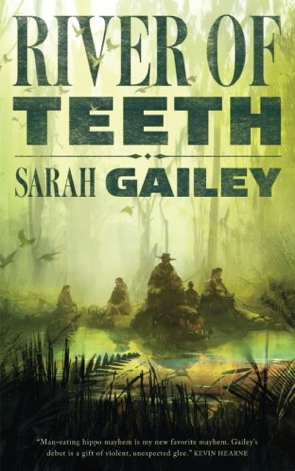
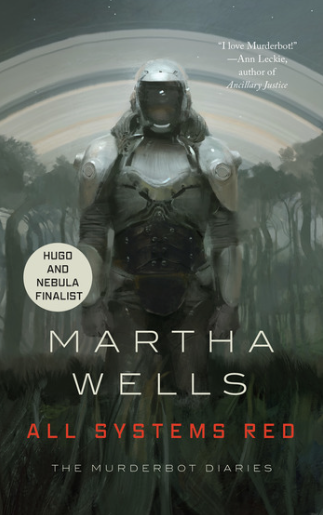
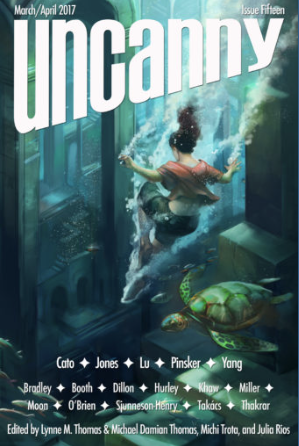
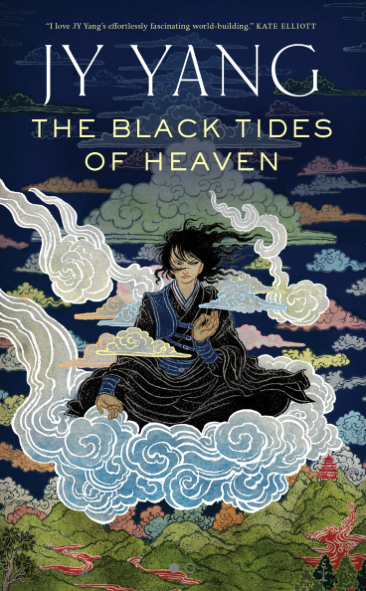
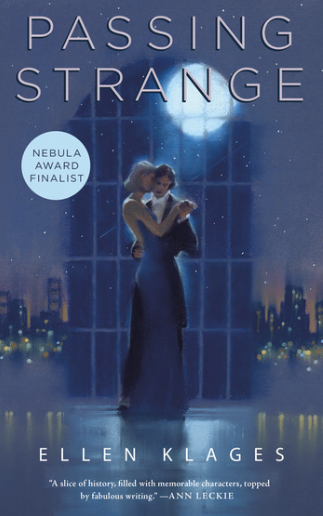
















Cadwell Turnbull's new novel — the first in a trilogy — imagines the hard, uncertain work of a fantastical justice.